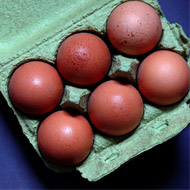700,000 contaminated eggs distributed to Britain

The products affected are processed foods in which egg is in one ingredient among many others.
The number of eggs contaminated with Fipronil that have come to the UK from the Netherlands is closer to 700,000 than the 21,000 previously thought, the Food Standards Agency (FSA) has confirmed.
The products affected are processed foods in which egg is one ingredient among many others, mostly used in sandwich fillings or other chilled foods. It is not thought that fresh eggs are affected.
While some of these products have a short shelf life and will have already been consumed, the FSA identified some that were still within the expiry date. These products have now been withdrawn by the businesses involved.
“I’m confident that acting quickly is the right thing to do. The number of eggs involved is small in proportion to the number of eggs we eat, and it is very unlikely that there is a risk to public health,” said Heather Hancock, chairman of the FSA.
“Based on the available evidence there is no need for people to change the way they consume or cook eggs. However, Fipronil is not legally allowed for use near food-producing animals and it shouldn’t be there.”
According to the FSA, the figure of 700,000 represents 0.007 per cent of the eggs consumed in the UK every year. The majority of eggs (85 per cent) are laid here and there is currently no evidence to suggest that they are contaminated of that Fipronil has been used inappropriately.
The FSA stressed that the decision to withdraw the affected products is not due to food safety concerns, but is based on the fact that Fipronil is not authorised for use in food-producing animals.



 The latest
The latest